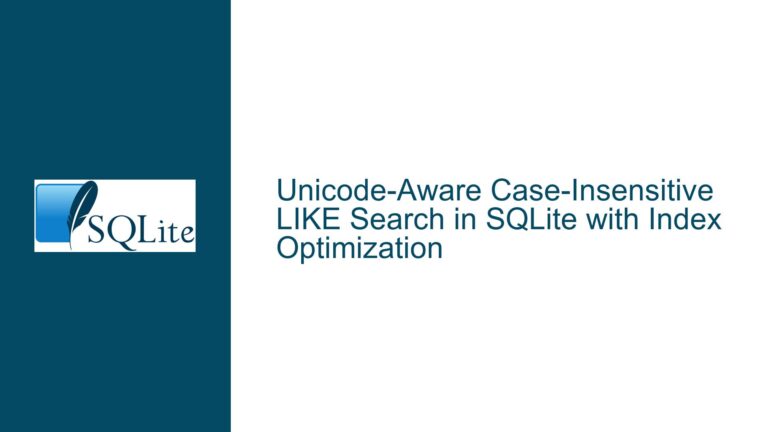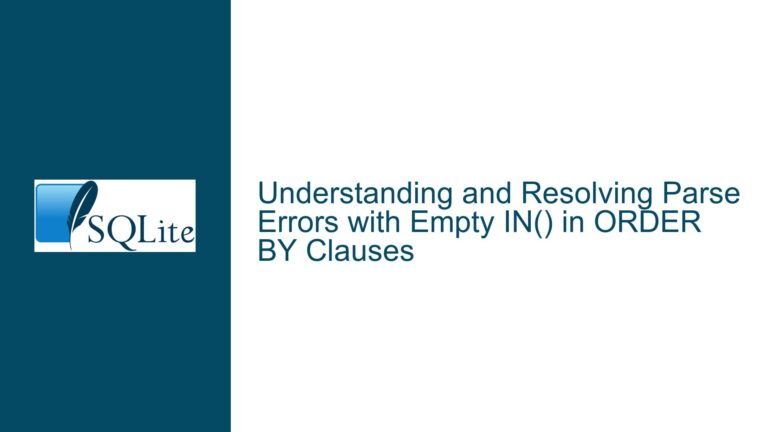SQLite JOIN Optimization Affects Query Validity with SimplifyJoin Flag
JOIN Clause Semantic Validation and Optimization Dependencies in SQLite
SQLite’s query processing engine implements sophisticated JOIN optimization strategies that can significantly impact query validity, particularly when dealing with LEFT JOIN operations and column references across tables. The core challenge emerges from the interaction between SQLite’s JOIN clause semantic validation and its optimization framework, specifically the SQLITE_SimplifyJoin optimization flag. This optimization can transform semantically problematic queries into valid ones, creating a dependency between query execution success and the optimization state.
The semantic validation in SQLite enforces strict rules about column references in JOIN conditions. When processing JOIN operations, SQLite validates that columns referenced in ON clauses only refer to tables that have been previously processed in the query execution plan. This validation becomes particularly critical when dealing with LEFT JOIN operations, as these maintain different semantics regarding null handling and table relationships compared to regular INNER JOINs.
The SQLITE_SimplifyJoin optimization, controlled through the sqlite3_test_control interface with the SQLITE_TESTCTRL_OPTIMIZATIONS parameter, can alter the execution path of queries by reorganizing JOIN operations. When enabled, this optimization can rewrite query plans to improve efficiency, potentially masking semantic validation issues that would otherwise cause query execution failures.
Query Plan Transformation and Validation Constraints
The fundamental complexity arises from SQLite’s query plan transformation process, which operates at multiple levels:
The first level involves semantic validation of column references in JOIN conditions. SQLite enforces that columns referenced in ON clauses must belong to tables that are already processed in the left-to-right evaluation order. This constraint becomes particularly relevant when dealing with complex JOIN chains involving multiple tables.
The SQLITE_SimplifyJoin optimization can transform LEFT JOIN operations into regular JOIN operations under certain conditions. This transformation occurs when the optimizer determines that the LEFT JOIN semantics can be preserved while simplifying the query plan. The optimization can effectively reorder JOIN conditions and table references, potentially moving previously invalid column references into valid positions.
Consider a query structure like:
FROM table_a LEFT JOIN table_b ON table_a.col = table_c.col JOIN table_c ON condition
Without optimization, SQLite’s validator identifies the reference to table_c in the first ON clause as invalid since table_c hasn’t been processed yet. However, with SQLITE_SimplifyJoin enabled, the optimizer can transform this into an equivalent form where table_c’s reference becomes valid.
The validation process becomes more complex when dealing with multiple JOIN conditions and table references. The optimizer must ensure that any transformations preserve both the semantic meaning of the query and maintain data consistency, particularly regarding NULL handling in LEFT JOIN operations.
Comprehensive Resolution Strategy and Implementation Guidelines
To address the challenges posed by JOIN optimization dependencies, several approaches and considerations should be implemented:
Query Design Best Practices
Write JOIN conditions that explicitly reference only tables that have been previously declared in the FROM clause and JOIN chain. This ensures query validity regardless of optimization settings:
-- Correct approach
SELECT * FROM table_a
LEFT JOIN table_b ON table_a.col = table_b.col
JOIN table_c ON table_b.col = table_c.col
Optimization Control
When developing applications that require consistent query behavior, explicitly control optimization settings through the sqlite3_test_control interface:
sqlite3_test_control(SQLITE_TESTCTRL_OPTIMIZATIONS, db, 0x00002000);
This allows for predictable query validation behavior across different execution contexts.
Query Validation Framework
Implement a comprehensive query validation framework that checks JOIN conditions before execution:
-- Validation query template
WITH RECURSIVE
validation_check AS (
SELECT table_name, column_name
FROM sqlite_master
WHERE type = 'table'
-- Additional validation logic
)
SELECT * FROM validation_check;
Schema Design Considerations
Design database schemas that minimize complex cross-table references in JOIN conditions. Consider denormalization strategies where appropriate to simplify JOIN operations:
CREATE TABLE denormalized_view AS
SELECT a.*, b.column_name
FROM table_a a
LEFT JOIN table_b b ON a.id = b.a_id;
Error Handling Implementation
Develop robust error handling mechanisms that can gracefully manage query failures due to optimization-dependent validation:
int execute_query(sqlite3 *db, const char *sql) {
char *error_message = NULL;
int rc = sqlite3_exec(db, sql, NULL, NULL, &error_message);
if (rc != SQLITE_OK) {
// Handle validation errors
sqlite3_free(error_message);
return rc;
}
return SQLITE_OK;
}
Query Plan Analysis
Utilize SQLite’s EXPLAIN QUERY PLAN functionality to understand how optimizations affect JOIN operations:
EXPLAIN QUERY PLAN
SELECT * FROM table_a
LEFT JOIN table_b ON table_a.col = table_c.col
JOIN table_c ON condition;
This helps identify potential validation issues before they occur in production environments.
Performance Monitoring
Implement comprehensive performance monitoring to track query execution patterns and optimization impacts:
CREATE TABLE query_metrics (
query_id INTEGER PRIMARY KEY,
query_text TEXT,
optimization_flags INTEGER,
execution_time REAL,
validation_status INTEGER
);
Transaction Management
Ensure proper transaction management when dealing with optimization-dependent queries:
BEGIN TRANSACTION;
SAVEPOINT before_complex_join;
-- Execute potentially problematic query
-- Roll back to savepoint if validation fails
ROLLBACK TO SAVEPOINT before_complex_join;
COMMIT;
The resolution of JOIN optimization dependencies requires a systematic approach that combines proper query design, optimization control, and robust error handling. By implementing these strategies, developers can ensure consistent query behavior across different optimization contexts while maintaining query performance and reliability.
When implementing these solutions, it’s crucial to maintain a balance between query optimization and validation consistency. The SQLITE_SimplifyJoin optimization provides valuable performance improvements, but its impact on query validation requires careful consideration during application development.
Regular testing of queries under different optimization configurations helps identify potential validation issues early in the development cycle. This testing should include both optimized and non-optimized execution paths to ensure consistent behavior across all possible scenarios.
Documentation of optimization dependencies and their impact on query validation should be maintained as part of the application’s technical documentation. This helps future developers understand the relationship between optimization settings and query behavior, facilitating proper maintenance and updates of the database system.






